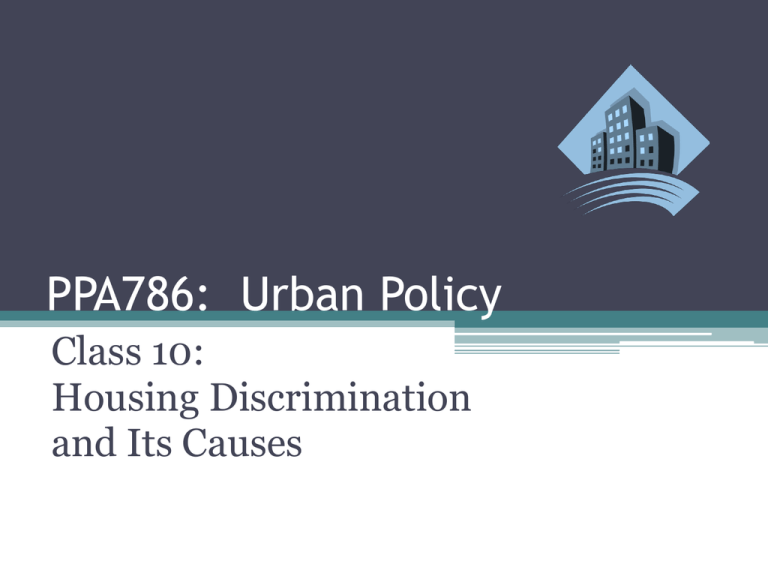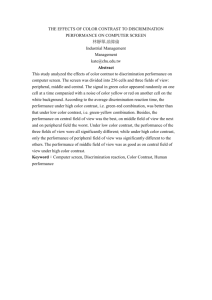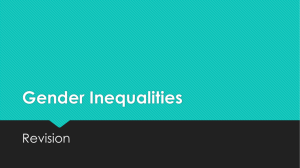PPA786: Urban Policy
advertisement

PPA786: Urban Policy Class 10: Housing Discrimination and Its Causes PPA786, Class 11: Housing Discrimination • Class Outline ▫ Race/Ethnicity and Homeownership ▫ Measuring housing discrimination with audits ▫ Theories about the causes of housing discrimination ▫ Evidence about the causes of housing discrimination ▫ Fair housing policy PPA786, Class 11: Housing Discrimination • Homeownership ▫ Differences in homeownership by group do not prove discrimination. ▫ But discrimination and disadvantages (including lower wealth and income) from past discrimination are the most likely explanations. ▫ Moreover, these gaps have not changed much in decades, suggesting, but not proving, that discrimination (and its legacy) are still important problems. PPA786, Class 11: Housing Discrimination PPA786, Class 11: Housing Discrimination • Studying Discrimination ▫ Recent studies of discrimination have focused on methods that try to isolate the impact of discrimination from the impact of other factors. ▫ To design good policy, we need good measures of the extent to which discrimination is taking place—and of its causes. ▫ The main technique is called a housing “audit.” Most audits allow a researcher to control for factors other than discrimination. Some recent “correspondence” audits use a randomassignment design. PPA786, Class 11: Housing Discrimination • Housing Audits (Also Called “Tests”) ▫ Matched pair design with two teammates who Are equally qualified for housing, Have the same characteristics, training, timing, and request, Differ on race or ethnicity. ▫ Audit teammates successively inquire about an advertised housing unit randomly selected from the newspaper. ▫ The order of their visits is randomized. PPA786, Class 11: Housing Discrimination • Housing Audits ▫ Used to Measure How Much Discrimination Exists. Discrimination exists if the minority auditors are systematically given less favorable treatment than their (equally qualified) teammates. ▫ Used to Test Hypotheses About the Causes of Discrimination. Audit studies can observe the circumstances under which discrimination occurs—and hence test theories that predict discrimination under some circumstances. PPA786, Class 11: Housing Discrimination • Strengths of Housing Audits ▫ Audits yield a powerful narrative, which makes cases of discrimination plausible in both research and court settings. ▫ Audits can control for virtually everything that a housing agent should consider in making decisions about a potential customer. ▫ Audits provide direct measures of discrimination, unlike other approaches, which look for signs of discrimination in housing prices, segregation patterns, and so on. PPA786, Class 11: Housing Discrimination • Weaknesses of In-Person Housing Audits ▫ Audits are expensive and hard to manage. ▫ Audits only observe the marketing phase of a transaction. ▫ Audits do not involve random assignment, so the possibility that the results reflect unobserved differences between teammates cannot be ruled out (although it can be minimized by good management). ▫ For important practical reasons, housing audits are not “double blind,” so the possibility that auditors try to influence the results cannot be ruled out (although it can be minimized by good management). PPA786, Class 11: Housing Discrimination • The Housing Discrimination Studies ▫ National studies were conducted in 1977, 1989, and 2000, and 2012. ▫ They were funded by HUD and ▫ Designed to give nationally representative estimates of discrimination. ▫ All 3 studies involved black-white audits and Hispanicwhite audits in both the sales and rental markets (about 1,000 audits in each category) ▫ HDS 2000 and 2012 also looked at discrimination against Asian-Americans and Native-Americans. PPA786, Class 11: Housing Discrimination • Discrimination in Black-White Rental Audits Coefficient Incidence 2000 1989 2000 1989 Advertised unit available 0.620* 0.398* 0.059 0.057 Advertised unit inspected 0.586* 0.790* 0.063 0.112 Similar unit available 0.036 0.373* 0.004 0.04 Similar unit inspected 0.031 0.542* 0.002 0.038 How many units recommended 0.601* 1.069* 0.105 0.211 How many units inspected 0.695* 1.199* 0.102 0.197 Incentive provided 1.548 0.658* 0.075 0.046 Asked to fill out application 0.375 -0.179 0.05 -0.024 PPA786, Class 11: Housing Discrimination • Discrimination in Hispanic-White Rental Audits Coefficient Incidence 2000 1989 2000 1989 Advertised unit available 1.886* 0.718* 0.125 0.093 Advertised unit inspected 0.362 0.145 0.046 0.019 Similar unit available 0.04 0.075 -0.002 -0.001 Similar unit inspected 0.428 0.742* 0.029 0.061 How many units recommended 0.361* 0.435* 0.083 0.088 How many units inspected 0.179 0.361* 0.029 0.054 Incentive provided -0.208 1.271 0.023 0.077 Asked to fill out application -0.017 0.252 0.005 0.03 PPA786, Class 11: Housing Discrimination • Discrimination in Black-White Sales Audits Coefficient 2000 1989 Incidence 2000 1989 Advertised unit available 0.031 0.860* 0.007 0.119 Advertised unit inspected 0.268 0.607* 0.066 0.149 Similar units inspected 0.611* 0.690* 0.146 0.137 Follow-up contact made 0.191 0.655* 0.039 0.108 Financial help offered 0.22 0.706* 0.054 0.147 PPA786, Class 11: Housing Discrimination • Discrimination in Hispanic-White Sales Audits Coefficient Incidence 2000 1989 2000 1989 Advertised unit available -0.235 1.483* -0.049 0.246 Advertised unit inspected -0.44 0.784* -0.109 0.189 Similar units inspected 0.16 0.774* 0.04 0.153 Follow-up contact made 0.32 1.338* 0.067 0.168 1.374* 0.306 0.330 0.069 Financial help offered PPA786, Class 11: Housing Discrimination Source: HDS 2012 PPA786, Class 11: Housing Discrimination Source: HDS 2012 PPA786, Class 11: Housing Discrimination • Discrimination against Other Groups ▫ In the case of Asian-Americans, HDS 2000 and 2012 found Discrimination in the sales market is comparable to discrimination against blacks, but There is not much evidence of discrimination in the rental market. ▫ HDS 2000 found higher rental-market discrimination against Native-Americans than against blacks or Hispanics. PPA786, Class 11: Housing Discrimination • Correspondence Audits ▫ Several correspondence audits (in several countries) look into rental housing discrimination using apartment ads on a selected web site. ▫ Race or ethnicity is signaled by the name attached to each inquiry. ▫ This is a more precise methodology because it can literally assign race or ethnicity randomly. ▫ But it asks a narrower question because it can only observe the initial response of a landlord to an inquiry. PPA786, Class 11: Housing Discrimination • Hanson & Hawley (Journal of Urban Economics, September-November, 2011) ▫ This study is based on ads posted on Craigslist. ▫ They conducted 4,725 audits in 10 large cities. ▫ Overall, the probability of a response for an applicant with a “white” name was 4.54% higher than for an applicant with a “black” name. ▫ This difference ranged from over 8% in Boston and Los Angeles to less than 1% in Atlanta and Dallas. PPA786, Class 11: Housing Discrimination • Hypotheses about the Causes of Housing Discrimination ▫ Agent Prejudice Agents may act out of their own prejudice. ▫ White Customer Prejudice Agents may act to protect an existing white customer base. ▫ Statistical Discrimination Agents may make a greater effort if transaction is thought to be more likely. This could reflect perceived preferences of their customers, agent stereotypes, or perceived constraints, such as discrimination by lenders. PPA786, Class 11: Housing Discrimination • ORY Study: Findings on the Causes of Discrimination ▫ Asking Price Agents’ marketing effort increases with asking price for whites but not for blacks. For blacks, not whites, a unit is more likely to be shown if it is cheaper or smaller than the advertised unit. These results suggest that agents have preconceptions about blacks’ ability to pay for expensive houses, a sign of statistical discrimination. PPA786, Class 11: Housing Discrimination • ORY Study: Findings on the Causes of Discrimination, continued ▫ Race/Ethnicity of Agent Like most other studies, ORY do not find that black agents discriminate less against blacks than do white agents. ▫ Agency Size ORY find that large agencies discriminate less than small agencies, either because they are better informed about the law or because they do not depend on business from a particular neighborhood of (prejudiced) whites. PPA786, Class 11: Housing Discrimination • Fair Housing Legislation ▫ The Civil Rights Act of 1866 ▫ The Civil Rights Act of 1968 ▫ The Fair Housing Amendments Act of 1988 ▫ Legislation creating FHAP and FHIP in the 1980s PPA786, Class 11: Housing Discrimination • The Civil Rights Act of 1866 ▫ This act was resurrected by a U.S. Supreme Court decision in 1968. ▫ It prohibits disparate-treatment discrimination on the basis of race in all forms of contracting. ▫ It has been widely used in fair housing litigation by local fair housing organizations. PPA786, Class 11: Housing Discrimination • The Civil Rights Act of 1968 ▫ This important law was passed right after the assassination of Martin Luther King, Jr. ▫ It has strong language prohibiting discrimination in housing of many forms, including redlining and disparate-impact. ▫ It had very weak enforcement provisions and excludes sales by owner and rentals in owner-occupied 1-4 family buildings. ▫ It gives private fair housing groups standing to sue. PPA786, Class 11: Housing Discrimination • The Fair Housing Amendments Act of 1988 ▫ This law added much stronger enforcement provisions, including large fines. ▫ It set up administrative law judge system (although either party can request federal court). ▫ It gave HUD extensive investigative powers, which have been little-used so far. PPA786, Class 11: Housing Discrimination • FHAP and FHIP ▫ FHAP is the Fair Housing Assistance Program. It provides financial assistance to state and local government fair housing offices, Which are required to process cases first (if their law is “equivalent” to federal law) ▫ FHIP is the Fair Housing Initiatives Program. It supports private fair housing groups, Such as the Fair Housing Council of Central New York, Which are the backbone of the enforcement system. PPA786, Class 11: Housing Discrimination • Audits as an Enforcement Tool ▫ Audits were developed by private fair housing groups to help with their enforcement efforts. ▫ HUD, Justice, and private fair housing groups have made extensive use of audits as an enforcement tool. ▫ Audit evidence of discrimination has proven to be very effective in court proceedings.





